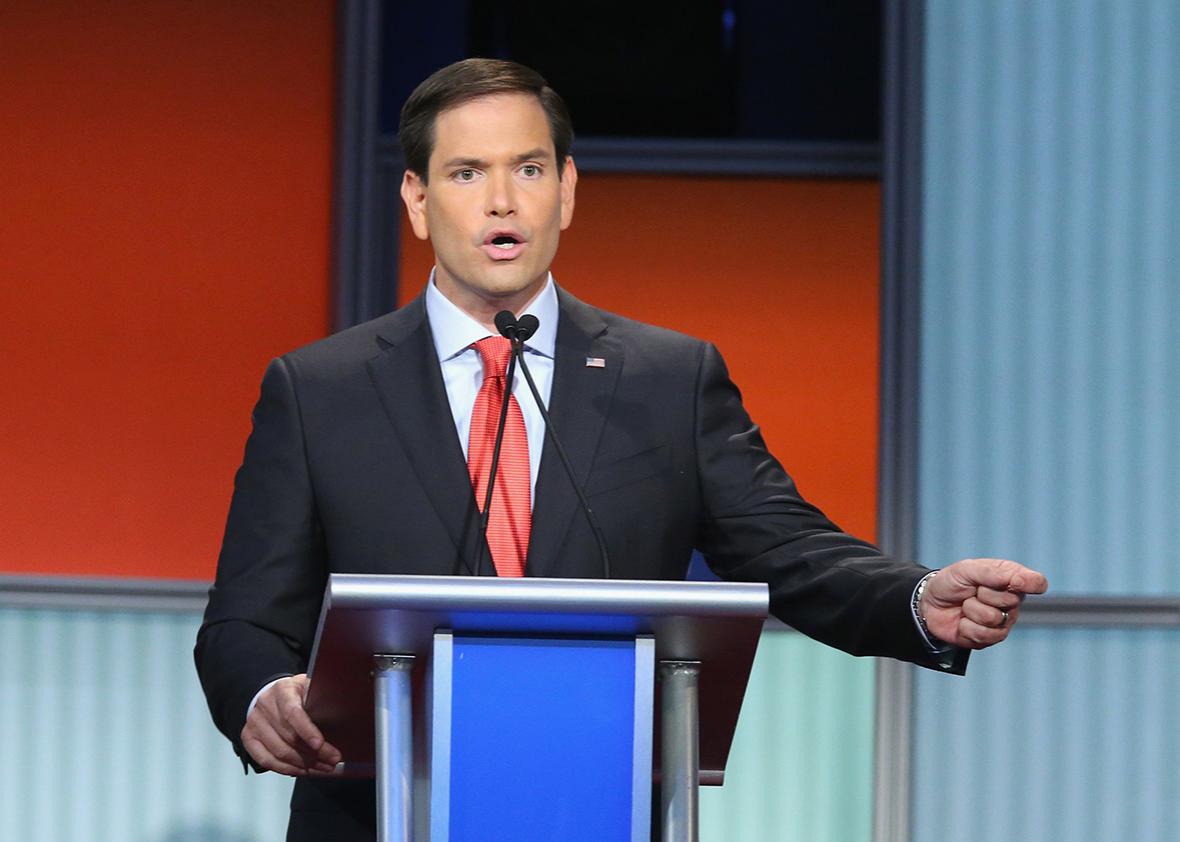There were 10 candidates in Thursday’s prime-time Republican presidential debate, but there’s an easy answer for who won: Marco Rubio.
On the surface, this seems unremarkable. It’s almost cliché, but the Florida senator is a gifted, empathetic communicator with a knack for blending policy with his personal story. But it’s one thing to use those skills on the stump or during a meet and greet with supporters; it’s something else to show them in the cramped confines of a presidential primary debate, especially when there are nine other candidates, at least one of whom is a wild card—Donald Trump—who could derail the entire conversation with a single tangent.
But Rubio shined. Despite limited time—overall in the 2-hour debate, he had 6 minutes and 49 seconds to speak, compared with 11 minutes for Trump—he gave strong answers to the sharp questions from the Fox News moderators, and Megyn Kelly in particular. Take immigration, which consumed a huge chunk of the first hour of the debate.
Jeb Bush began with a rote answer, meant to thread the needle between his past support for comprehensive reform and his present opposition. “I believe that the great majority of people coming here illegally have no other option. They want to provide for their family,” he said. “But we need to control our border. It’s not—it’s our responsibility to pick and choose who comes in.”
But while Bush spoke first, he didn’t set the tone of the segment. That fell to Trump, who railed against the alleged danger of unauthorized immigrants: “The fact is, since then, many killings, murders, crime, drugs pouring across the border, are money going out and the drugs coming in. And I said we need to build a wall, and it has to be built quickly.” After huge applause, moderator Chris Wallace pressed him for evidence of immigrant crime—one early indication that the Fox News team was trying to undermine Trump as much as possible—but the reality television star had an answer for that, too. “The Mexican government is much smarter, much sharper, much more cunning. And they send the bad ones over because they don’t want to pay for them. They don’t want to take care of them.”
No candidate matched Trump in vehemence—although Texas Sen. Ted Cruz tried as hard as he could—but several candidates tried to walk a similar, if less bigoted, line. Even Ohio Gov. John Kasich—a relative moderate—praised Trump for “hitting a nerve” with the country on immigration.
Enter Rubio. In substance, he’s not far from his more mainstream colleagues. But he didn’t indulge Trump’s affect. Instead, he gave a fact check and a strong answer on border security and the realities of the immigration process:
Let me set the record straight on a couple of things. The first is, the evidence is now clear that the majority of people coming across the border are not from Mexico. They’re coming from Guatemala, El Salvador, Honduras. Those countries are the source of the people that are now coming in its majority.
I also believe we need a fence. The problem is if El Chapo builds a tunnel under the fence, we have to be able to deal with that too. And that’s why you need an e-verify system and you need an entry-exit tracking system and all sorts of other things to prevent illegal immigration. But I agree with what Gov. Kasich just said. People are frustrated. This is the most generous country in the world when it comes to immigration. There are a million people a year who legally immigrate to the United States, and people feel like we’re being taken advantage of. We feel like, despite our generosity, we’re being taken advantage of.
The people that call my office, who have been waiting for 15 years to come to the United States. And they’ve paid their fees, and they hired a lawyer, and they can’t get in. And they’re wondering, maybe they should come illegally.
This was a forceful answer, delivered with compassion and confidence. Compare it with Gov. Scott Walker’s, which was muddled, to say the least. Walker said he was “listening” to the American people and warned the audience of the “international criminal organizations penetrating our Southern-based borders.” It was milquetoast, the kind of answer you give when you’re not exactly prepared.
And this, indeed, was the pattern of the entire debate. Rubio didn’t speak long, but when he had a chance, he gave the strongest—or at least the most digestible—answer. When Kelly challenged him on abortion, for instance—“You don’t favor a rape and incest exception?”—Rubio denied his prior votes for these exceptions and replied with a television-ready line:
I have never said that. And I have never advocated that. What I have advocated is that we pass law in this country that says all human life at every stage of its development is worthy of protection.
In fact, I think that law already exists. It is called the Constitution of the United States.
The audience loved it.
The practical impact of Rubio’s strong performance—and of the middling showing from Walker and Bush, who stumbled over lackluster answers—is to boost his modest standing among Republican voters. Unlike Cruz, who is divisive and unelectable, or Gov. Chris Christie—who is a tad too moderate for national GOP tastes—Rubio’s problem has more to do with circumstance than affect or ideology. With experienced candidates like Walker and quasi-consensus figures like Bush, he is surrounded by credible contenders. And despite his obvious skills, he can’t quite show why he is the choice over them. To most Republicans, this makes him the obvious second-choice pick—someone to support, but not yet.
With Thursday’s performance, Rubio may have moved to the top of a few lists. And while that’s far from dispositive, it’s the kind of thing that always helps, whether with money, or endorsements, or just good attention.
